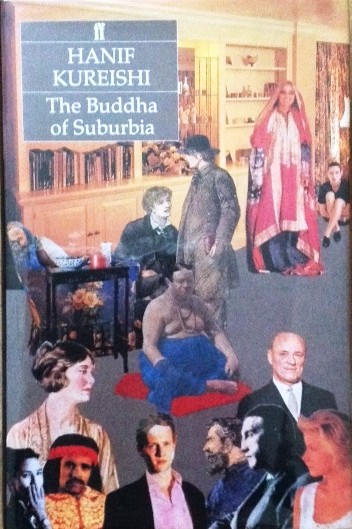Inspiring Older Readers
 posted on 03 Apr 2022
posted on 03 Apr 2022
The Buddha of Suburbia by Hanif Kureishi
The Buddha of Suburbia was Hanif Kureishi’s 1990 debut novel and won him the Whitbread Award for that year. In many ways this is a late 20th century reworking of the picaresque bildungsroman of the kind that was pioneered by the 18th century novelist, Henry Fielding. His creation, Tom Jones, shares plenty in common with the central character and narrator of this story, Karim. Both Tom and Karim are young, fancy-free, a touch too innocent for their own good and careering through life as they bounce from one socially compromising situation to another. However, unlike Tom, Karim is fluid in terms of his sexuality and is a bit more street-wise than the sometimes gormless hero of Fielding’s masterpiece.
What the picaresque format allows the author to do is to drop the central character in the most unlikely of circumstances and heap on the satire and occasional bit of slapstick humour. Because the purpose of the book is to entertain while laying bare the follies of society there’s no real need to make the supporting cast fully-rounded real people with their own back stories. Instead they can remain two-dimensional and can be moved around at the whim of the author and painted as grotesque or glamorous without having any complications of motive and consistency.
Kureishi takes full advantage of these conventions and positively revels in them. But it wasn’t just Karim’s plunge into the dissolute world of sex, drugs and rock and roll that made this novel such a sensation when it was first published. Although it was written at the back end of the 1980s, the action all takes place in the 1970s, virtually covering the whole decade. But, cunningly, Kureishi captures the zeitgeist of the end of the Thatcher decade by burrowing into the underbelly of the period that had gone before and which had been the genesis of neoliberalism.
But what really broke fresh ground here was that Karim was a young man of mixed heritage and, on top of that, working class. Race, ethnicity and identity are right at the heart of the book. Writing for The Guardian in 2020, Kureishi himself says of Karim:
“Karim my avatar, who likes both boys and girls in bed, is determinedly wild and rash. But Karim knows something that most people don’t: that being a person of colour isn’t at all like being white. No white person thinks of themselves as a problem for others, a question, a perplexity. No one asks them where they’re really from. White people belong in the world. It’s theirs, they own it, and they don’t even appreciate it. But they do get defensive when you point it out. Karim understands that being a person of colour means being bullied. Yet while white people might consider themselves superior, it’s more original and enjoyable being underneath, laughing up at the poverty of privilege. Karim begins to get that his disadvantage is his advantage. Then he stops caring either way. He’s free.”
Much of the humour and satire that the book generates as Karim grows up in London, flitting in and out of theatre world, watching his friends and family change as the culture around them morphs, is very broad. He plays around with archetypes – the Asian corner shop family, radical feminism, cultural pretenders and pseuds all get a good bashing. But what makes it all palatable and not just cruel is that he never loses his underlying innocence – at one level he seems to have been corrupted but the bedrock of his personality seems to survive and Karim knows where to lay the blame for the folly he witnesses. His father, for example – the Buddha of the title – comes in for plenty of humorous picking and prodding but it never becomes malicious. The fact that he sees himself as a seer and sage is less a comment on him than on those who flock to follow him and swallow his platitudes.
Ultimately Karim has a conscience that defies money and fame and he has the self-awareness to know when he’s exploiting others or being exploited himself. As Zadie Smith says at the end of her extensive review of the book which can be found on the British Library website:
“…Karim is both free and not free at the same time. For him England is, in so many ways, impossible – but it is also his playground. Both versions of his experience are true. That is the great discomfort and irresponsible charm of this lovely, funny, honest novel.”
Plenty of paperback editions are available for well under £10 but hardbacks are getting harder to find – and more expensive.
Terry Potter
April 2022